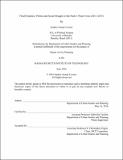Fluid dynamics : politics and social struggle in São Paulo's water crisis (2014-2015)
Author(s)
Araujo Cruxen, Isadora
DownloadFull printable version (1.600Mb)
Alternative title
Politics and social struggle in São Paulo's water crisis (2014-2015)
Other Contributors
Massachusetts Institute of Technology. Department of Urban Studies and Planning.
Advisor
Gabriella Carolini.
Terms of use
Metadata
Show full item recordAbstract
In late 2013, a severe drought hit the metropolitan region of Sao Paulo, Brazil's most populous city and main economic center, and precipitated a water supply crisis. As water availability became increasingly strained during 2014, myriad collective action efforts by civil society actors sprung up in the city. My thesis explores this social mobilization around Sao Paulo's supply crisis as a window into water politics and governance when water supply problems and solutions are unclear but have important political and service repercussions for different stakeholders. Two interrelated questions guided the research: How and why did particular forms of social mobilization around the water supply crisis emerge and develop? How did civil society actors transform their problem definitions into action strategies? I answer these questions by tracing the mobilization process of two broad-based civil society coalitions that emerged in the context of the crisis: the Alliance for Water (Alianca pela Agua) and the Collective for Water Struggle (Coletivo de Luta pela Agua). This analysis helps uncover underlying value disputes shaping how different actors framed problems and opportunities during the crisis. At the same time, it sheds light on the ways in which maintaining flexible problem frames and fluid relationships with one another allowed the two coalitions to reach beyond ideological stances and traditional strategies. Through fluid mobilization dynamics, they were able to either carve or take advantage of spaces for participation while still advancing particular organizational goals. While it is not clear what the long-term outcomes of mobilization will be, I argue that the efforts of both coalitions served to amplify different civil society voices, facilitate knowledge sharing about water issues, and open up channels for greater participation in water governance.
Description
Thesis: M.C.P., Massachusetts Institute of Technology, Department of Urban Studies and Planning, 2016. This electronic version was submitted by the student author. The certified thesis is available in the Institute Archives and Special Collections. Cataloged from student-submitted PDF version of thesis. Includes bibliographical references (pages 110-115).
Date issued
2016Department
Massachusetts Institute of Technology. Department of Urban Studies and PlanningPublisher
Massachusetts Institute of Technology
Keywords
Urban Studies and Planning.